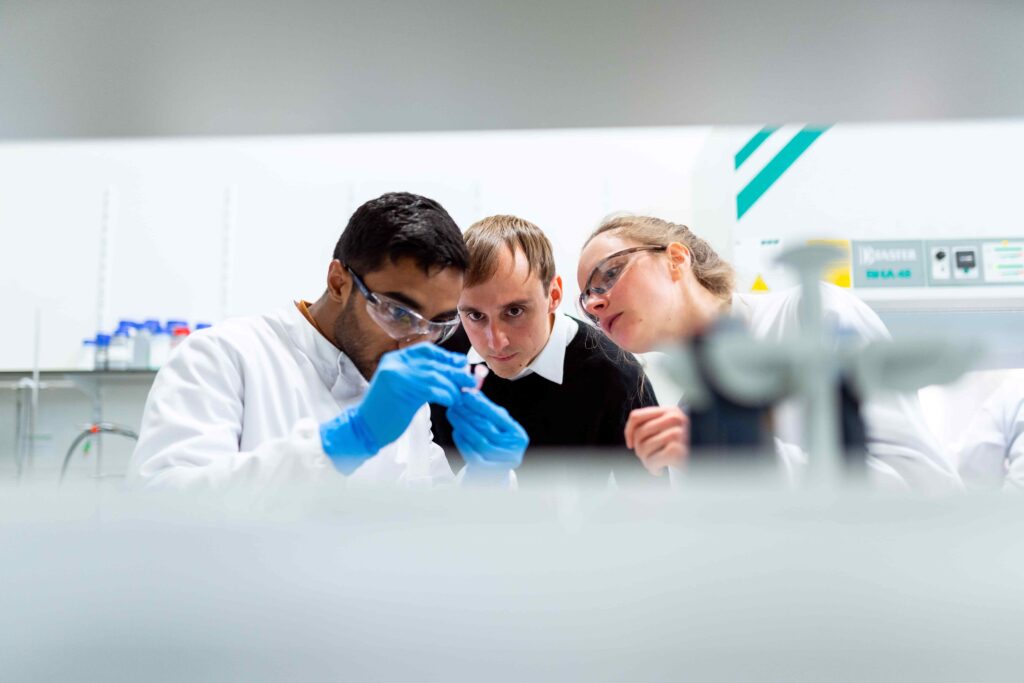Research Fellowships

UNC Lineberger offers research fellowship training opportunities that span the spectrum of cancer. These training programs are part of NIH-funded T32 Training Grants, which enable institutions to recruit individuals selected by them for predoctoral and postdoctoral research training in specified shortage areas. The goal of the T32 grants program is to prepare qualified predoctoral and postdoctoral trainees for careers that have a significant impact on health and cancer-related research.
Predoctoral Fellowships
Biostatistics for Research in Genomics and Cancer
The Biostatistics for Research in Genomics and Cancer program trains students in statistical genomics with a major emphasis on cancer genomics. The program’s goals include training biostatisticians in the biology, etiology, and genetics of cancer; teaching trainees to conduct state-of-the-art methodological research relevant to the genomics of cancer and related areas of genomics; and producing biostatisticians who can collaborate with other scientific researchers and oncologists to research issues in genomics and cancer.
Cancer Care Quality Training Program
The Cancer Care Quality Training Program (CCQTP) offers training to clinician and non-clinician scientists who wish to work in multidisciplinary research teams to improve cancer care quality across the cancer care continuum.
Cancer Cell Biology Training Program
The Cancer Cell Biology Training Program (CCBTP) trains students in the paradigms of molecular and cellular biology. With an increasing emphasis on translational, disease-oriented research, the need to address this deficiency in graduate student training has become of greater urgency. The broad goal of this program is to provide comprehensive training in cancer biology to allow students to effectively contribute to the new wave of translational research.
Cancer Control Education Program
The Cancer Control Education Program (CCEP) trains fellows for careers as independent investigators in interdisciplinary and collaborative cancer prevention and control research.
Integrated Translational Oncology Program
The Integrated Translational Oncology Program (iTOP) focuses on training clinicians, basic scientists, and MD-PhD candidates in clinical/translational research.
Medical Student Training in Aging Research
The Medical Student Training in Aging Research (MSTAR Program) provides medical and osteopathic students early in their training with an enriching experience in aging-related research and geriatrics, under the mentorship of top experts in the field. This program introduces students to research and academic experiences that they might not otherwise have during medical school.
PARTNERS Research and Training Program in Health Disparities
The Partners Research Program provides educational training opportunities for undergraduate students to pursue careers in cancer health disparities. The Partners Program introduces students to basic cancer laboratory research and to public health research in areas relevant to disparities in the prevention, incidence, treatment, mortality and morbidity of cancer.
Postdoctoral Fellowships
Cancer Care Quality Training Program
The Cancer Care Quality Training Program (CCQTP) offers training to clinician and non-clinician scientists who wish to work in multidisciplinary research teams to improve cancer care quality across the cancer care continuum.
Cancer Control Education Program
The Cancer Control Education Program (CCEP) trains fellows for careers as independent investigators in interdisciplinary and collaborative cancer prevention and control research.
Cancer Epigenetics Training Program
The field of cancer epigenetics has already led to the development of novel and effective therapies for several human cancers. With our outstanding mentors and able leadership team, the Cancer Epigenetics Training Program (CETP) will yield the next generation of young scientists who focus on the role of epigenetic changes in human tumor development.
Cancer Health Disparities Training Program
The Cancer Health Disparities Training Program offers training on cross-cutting health disparity issues across the cancer continuum, from etiology and primary prevention to survivorship. The program includes the major cancers and addresses risk factors, epidemiological bases of disparities, detection, epidemiology, research methods, prevention and control, promotion, screening, communication, community-based participatory research and policy.
Carolina Cancer Nanotechnology Training Program
The overarching goal of the Carolina Cancer Nanotechnology Training Program (CCNTP) is to equip a cohort of outstanding young scientists with the multidisciplinary concepts and skills needed to improve cancer diagnosis and therapy based on concepts, tools and discoveries made in nanoscience and nanotechnology. These young scientists will successfully pursue careers in academia, industry, and government agencies, and they will become significant contributors to addressing emerging challenges in public health and medical research using nanotechnology to diagnose and treat cancer.
Integrated Translational Oncology Program
The Integrated Translational Oncology Program (iTOP) focuses on training clinicians, basic scientists, and MD-PhD candidates in clinical/translational research.
Marilyn Gentry Fellowship Program in Nutrition and Cancer
The American Institute for Cancer Research’s Marilyn Gentry Fellowship is a research program that supports emerging leaders in the field of diet, nutrition, and cancer. The fellowship provides early career investigators the opportunity to work in a mentored environment, and gives them access to the resources of the Institute for the Advanced Study of Diet, Nutrition and Cancer and the Michael Hooker Research Center at UNC-Chapel Hill.
Preventive Medicine Residency in Cancer Prevention and Control
The UNC Preventive Medicine Residency Program offers preventive medicine residency training in cancer prevention and control. Residents will take part in the activities of the UNC Lineberger Cancer Control Education Program and will have an opportunity to work with nationally-known faculty in the Schools of Medicine and Public Health and the UNC Lineberger Comprehensive Cancer Center.
UNC Geriatric Oncology Training Grant (UNC-GO)
The UNC Geriatric Oncology Training Grant (UNC-GO) is specifically focused on training physicians in clinical/translational and/or health services research at the interface of Geriatrics and Oncology. Our overarching goal is to develop a cadre of physician/scholars who can provide national leadership in the growing research field of Geriatric Oncology.
UNC Immunotherapy Training Grant (IM-TAG)
The UNC-Chapel Hill Immunotherapy Training Grant (IM-TAG) trains postdoctoral fellows in pre-clinical and/or clinical research focusing on tumor immunotherapy and/or stem cell transplantation immunology.
